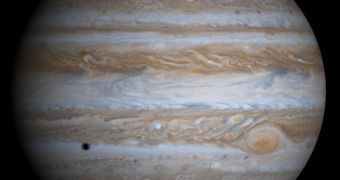Experts in advanced mathematics have recently proposed a new model to explain our Universe that is so different from what we have held as true thus far, that it has left many gasping for air. According to the new theory, it may be that our Universe is not expanding at all. Rather, galaxies appear to be pushing away from each other on account of a Big Bang-triggered phenomenon aptly named the Big Wave, which is essentially an expanding wave flowing through space-time. The team believes that these waves could help explain why some of the most distant galaxies out there appear to be more distant than they should be, according to the Standard Model of Cosmology (SM).
“We're saying that maybe these expanding waves are actually causing the anomalous acceleration. We're saying dark energy is not really the correct explanation,” University of California in Davis (UCD) expert Blake Temple explains. The new set of equations revolves around Einstein's general theory of relativity, but also seems to offer a decent explanation for the observed cosmic expansion. Temple worked on the new calculations with University of Michigan colleague Joel Smoller, and the team published its results in the August 17th issue of the journal Proceedings of the National Academy of Sciences (PNAS).
“The research could change the way astronomers view the composition of our universe,” the authors write in the summary of their journal entry, admitting, however, that more verifications are in order before a final conclusion is drawn. They also say that the new equations may prove to be a very potent alternative to dark energy theories simply because the latter were developed hastily, when astronomers discovered that the Universe was expanding at an ever-increasing speed, and had no explanation for this.
Dark energy “just seems like an unnatural correction to the equations – it's like a fudge factor. The equations don't make quite as much physical sense when you put it in. You just put it in to fit the data,” Temple says, quoted by Space. “At this stage we think [the new equations are] a very plausible theory. We're saying there isn't any acceleration. The galaxies are displaced from where they're supposed to be because we're in the aftermath of a wave that put those galaxies in a slightly different position.”
The idea is, however, put under question by the fact that it would make for a pretty big coincidence for the Earth to be situated in such a manner in the Universe that we observe the expansion at constant rates in all directions. Maybe we are at the center of a smaller ripple, the expert adds.

 14 DAY TRIAL //
14 DAY TRIAL //